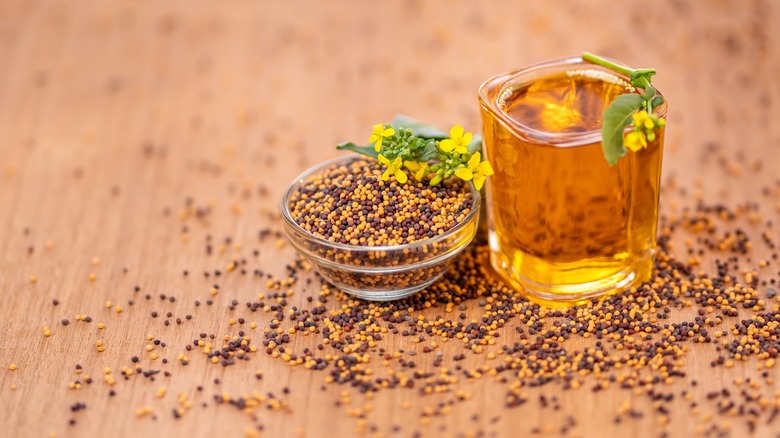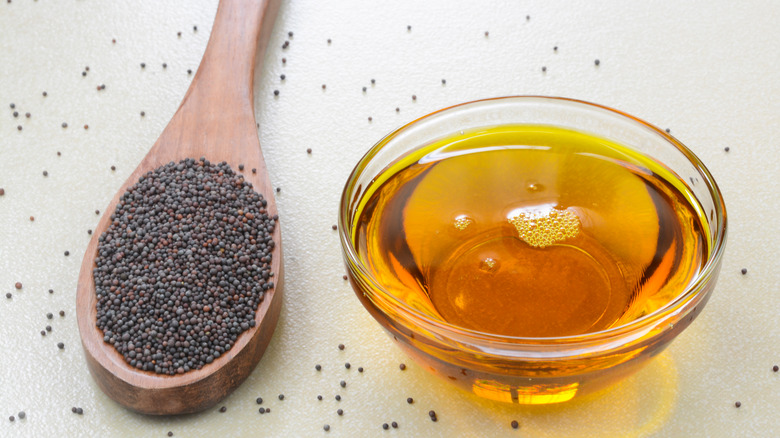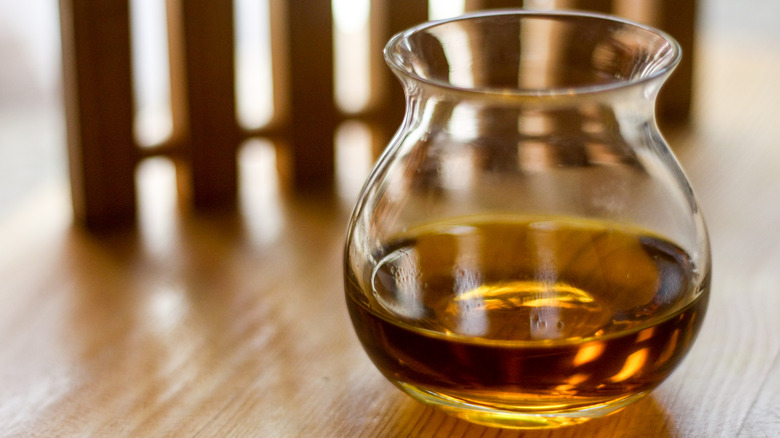Is Mustard Oil Actually Illegal In The US?
If you live in Asia and spend time in the kitchen, there's a good chance you're familiar with mustard oil. There's a lot to admire about this common ingredient. With a high smoke point, it's ideal for frying foods. Being produced from mustard seeds — it's also sometimes called mustard seed oil — it has a unique flavor, as well as an undeniable heat that's been likened to another member of the mustard family: wasabi. Mustard oil is particularly prized in Indian cooking, and especially in the northern part of the country. In states like Bengal, it's often used to make tadka — the flavorful infused oil is drizzled over dishes before serving — and can be a component of the spicy, oily Indian-style pickles known as achars.
And yet, if you go into an Indian grocery in the U.S. and look for mustard oil, you'll likely come across a bottle labeled "for external use only." The oil is popular as a massage oil, as it's said to improve circulation. With a few exceptions, mustard oil is banned for edible consumption in this country. That's owing to its high concentration of one type of fatty acid, called erucic acid, which has been linked to heart disease, causing the Food and Drug Administration to look askance at the product. Still, the debate on this one isn't totally settled — and it's not time to write mustard oil off just yet. Here are the ins and outs of this contested cooking oil.
What is mustard oil and why is it banned?
Mustard oil is produced by pressing the seeds of the mustard plant to extract the fat. It's particularly rich in one kind of monounsaturated fatty acid called erucic acid, which is found in many plants from the brassica family, like rapeseed, but comes in especially high concentrations in mustard. Based on early animal studies, scientists in the 20th century became worried that ingesting erucic acid could cause lipids to build up in the heart muscle, a condition called myocardial lipidosis, which over time weakens the heart's ability to contract. It was also shown to cause cardiac lesions in rats.
Concerns over the possible effects of erucic acid led the Food and Drug Administration to ban mustard oil for human consumption. Those same sorts of concerns also led to the development of a now ubiquitous cooking oil: canola oil. Invented in Canada — that's where the "can" in the name comes from — canola is produced from cultivars of the rapeseed that have lower concentrations of erucic acid (see our guide to common cooking oils). Canola is another high-smoke-point oil, but it's a poor substitute for mustard oil — after all, part of the appeal of canola is its neutral flavor, whereas mustard oil's spicy kick is traditionally one of its selling points.
The state of the mustard oil debate (and how you can get your hands on some)
The agreement on mustard oil isn't universal: Rather than ban the ingredient outright, the European Union, Australia, and New Zealand have taken a kind of middle-path approach, instead prescribing limits on how much should be consumed by humans. After all, it's a common cooking ingredient in the world's most populous country, India, where it's considered a heart-healthy oil by the Lipid Association of India. That gets to the big question around mustard oil's health effects: It's shown to cause heart problems in rats, though not necessarily humans. And humans could benefit from the fact that mustard oil is low in saturated fats — in this way, it's not unlike other "healthy" cooking oils, such as olive. In light of the potential benefits, a 2022 paper in the Journal of Clinical Lipidology recommended "a new FDA review" in the U.S. to get a better understanding of mustard oil's relationship to human health.
Some folks see mustard oil as following the trajectory set by monosodium glutamate, or MSG: a long-maligned product that today is finally escaping the harmful racial stereotypes that have traditionally accompanied it and being embraced for its flavor-boosting properties. Until that happens, though, producers have begun exploring oils made from mustard seeds bred to be low in erucic acid — like Carrington Farms, an Australian company that sells mustard oils in the U.S. In case there's any confusion, Carrington's bottles are also labeled with big bold letters that clarify their purpose — only these ones say "for cooking."


